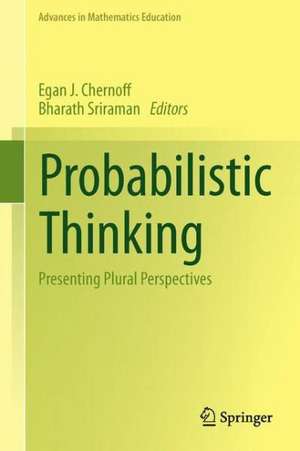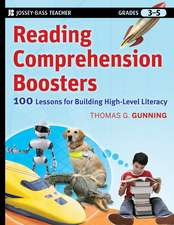Probabilistic Thinking: Presenting Plural Perspectives: Advances in Mathematics Education
Editat de Egan J. Chernoff, Bharath Sriramanen Limba Engleză Hardback – 18 dec 2013
| Toate formatele și edițiile | Preț | Express |
|---|---|---|
| Paperback (1) | 1326.52 lei 38-44 zile | |
| SPRINGER NETHERLANDS – 17 sep 2016 | 1326.52 lei 38-44 zile | |
| Hardback (1) | 1337.47 lei 38-44 zile | |
| SPRINGER NETHERLANDS – 18 dec 2013 | 1337.47 lei 38-44 zile |
Din seria Advances in Mathematics Education
- 15%
 Preț: 648.24 lei
Preț: 648.24 lei - 18%
 Preț: 905.06 lei
Preț: 905.06 lei - 15%
 Preț: 660.04 lei
Preț: 660.04 lei - 18%
 Preț: 959.98 lei
Preț: 959.98 lei - 15%
 Preț: 642.51 lei
Preț: 642.51 lei - 15%
 Preț: 661.97 lei
Preț: 661.97 lei - 15%
 Preț: 657.57 lei
Preț: 657.57 lei - 20%
 Preț: 581.65 lei
Preț: 581.65 lei - 15%
 Preț: 665.58 lei
Preț: 665.58 lei - 15%
 Preț: 653.14 lei
Preț: 653.14 lei - 24%
 Preț: 647.54 lei
Preț: 647.54 lei - 18%
 Preț: 1127.28 lei
Preț: 1127.28 lei - 18%
 Preț: 1129.02 lei
Preț: 1129.02 lei - 15%
 Preț: 656.89 lei
Preț: 656.89 lei - 18%
 Preț: 786.04 lei
Preț: 786.04 lei - 18%
 Preț: 1024.53 lei
Preț: 1024.53 lei - 15%
 Preț: 656.43 lei
Preț: 656.43 lei - 18%
 Preț: 1134.06 lei
Preț: 1134.06 lei - 24%
 Preț: 842.57 lei
Preț: 842.57 lei - 18%
 Preț: 898.26 lei
Preț: 898.26 lei - 18%
 Preț: 957.62 lei
Preț: 957.62 lei - 24%
 Preț: 991.37 lei
Preț: 991.37 lei - 24%
 Preț: 785.09 lei
Preț: 785.09 lei - 18%
 Preț: 1009.54 lei
Preț: 1009.54 lei - 18%
 Preț: 1013.96 lei
Preț: 1013.96 lei - 24%
 Preț: 790.73 lei
Preț: 790.73 lei - 24%
 Preț: 797.39 lei
Preț: 797.39 lei
Preț: 1337.47 lei
Preț vechi: 1759.83 lei
-24% Nou
Puncte Express: 2006
Preț estimativ în valută:
255.95€ • 277.93$ • 215.00£
255.95€ • 277.93$ • 215.00£
Carte tipărită la comandă
Livrare economică 18-24 aprilie
Preluare comenzi: 021 569.72.76
Specificații
ISBN-13: 9789400771543
ISBN-10: 9400771541
Pagini: 798
Ilustrații: XXI, 747 p. 164 illus.
Dimensiuni: 155 x 235 x 48 mm
Greutate: 1.25 kg
Ediția:2014
Editura: SPRINGER NETHERLANDS
Colecția Springer
Seria Advances in Mathematics Education
Locul publicării:Dordrecht, Netherlands
ISBN-10: 9400771541
Pagini: 798
Ilustrații: XXI, 747 p. 164 illus.
Dimensiuni: 155 x 235 x 48 mm
Greutate: 1.25 kg
Ediția:2014
Editura: SPRINGER NETHERLANDS
Colecția Springer
Seria Advances in Mathematics Education
Locul publicării:Dordrecht, Netherlands
Public țintă
ResearchCuprins
SERIES PREFACE: Gabriele Kaiser and Bharath Sriraman.- ACKNOWLEDGEMENTS.- FOREWORD: Keith Devlin.- INTRODUCTION: Egan Chernoff and Bharath Sriraman.- PERSPECTIVE I: MATHEMATICS AND PHILOSOPHY.- Preface to Perspective I: Mathematics and Philosophy: Egan Chernoff and Gale Russell.- I.I. A historical and philosophical perspective on probability: Manfred Borovcnik and Ramesh Kapadia.- I.II. From puzzles and paradoxes to concepts in probability: Manfred Borovcnik and Ramesh Kapadia.- I.III. Three approaches for modeling situation with randomness: Andreas Eichler and Markus Vogel.- I.IV. A modeling perspective on probability: Maxine Pfannkuch and Ilze Ziedins.- Commentary on Perspective I: Mathematics and Philosophy: Bharath Sriraman and Kyeong-Hwa Lee.- PERSPECTIVE II: PSYCHOLOGY.- Preface to Perspective II: Psychology : Wim van Dooren.- II.I. Statistical thinking: no child left behind: Björn Meder and Gerd Gigerenzer.- II.II. The A-B-C of probabilistic literacy: Laura Martignon.- II.III. Intuitive conceptions of probability and the development of basic math skills: Gary Brase, Sherri Martinie and Carlos Castillo-Garsow.- II.IV. Testing a model on probabilistic reasoning: Francesca Chiesi and Caterina Primi.- II.V. Revisiting the medical diagnosis problem: reconciling intuitive and analytical thinking: Lisser Rye Ejersbo and Uri Leron.- II.VI. Rethinking probability education: perceptual judgment as epistemic resource: Dor Abrahamson.- II.VII. Sticking to your guns: a flawed heuristic for probabilistic decision-making: Deborah Bennett.- II.VIII. Developing probabilistic thinking: what about peoples’ conceptions: Annie Savard.- Commentary I on Perspective II: Psychology : Brian Greer.- Commentary II on Perspective II: Psychology: Richard Lesh and Bharath Sriraman.- PERSPECTIVE III: STOCHASTICS.- Preface to Perspective III: Stochastics: Bharath Sriraman and Egan Chernoff.- III.I. Prospective primary school teachers’ perception of randomness: CarmenBatanero, Pedro Arteaga, Luis Serrano and Blanca Ruiz.- III.II. Challenges of developing coherent probabilistic reasoning: rethinking randomness and probability from a stochastic perspective: Luis Saldanha and Yan Liu.- III.III. “It is very, very random because it doesn’t happen very often”: examining learners’ discourse on randomness: Simin Jolafee, Rina Zazkis and Nathalie Sinclair.- III.IV. Developing a modelling approach to probability using computer-based simulations: Theodosia Prodromou.- III.V. Promoting statistical literacy through data modelling in the early school years: Lyn D. English.- III.VI. Learning Bayesian statistics in adulthood: Wolff-Michael Roth.- Commentary on Perspective III: Stochastics: Mike Shaughnessy.- PERSPECTIVE IV: MATHEMATICS EDUCATION.- Preface to Perspective IV: Mathematics Education: Bharath Sriraman and Egan Chernoff.- IV.I. A practitional perspective on probabilistic thinking models and frameworks: Edward S. Mooney, Cynthia Langrall and Joshua T. Hertel.- IV.II. Experimentation in probability teaching and learning: Per Nilsson.- IV.III. Investigating the dynamics of stochastic learning processes: Susanne Prediger and Susanne Schnell.- IV.IV. Counting as a foundation for learning to reason about probability: Carolyn A. Maher and Anoop Ahluwalia.- IV.V. Levels of probabilistic reasoning of high school students about binomial problems: Ernesto Sánchez and Pedro Rubén Landín.- IV.VI. Children’s construction of sample space with respect to the law of large numbers: Efi Paparistodemou.- IV.VII. Researching conditional probability problem solving: Pedro Huerta.- IV.VIII. Real life experiences as hindrance in probabilistic situations: Ami Mamolo and Rina Zazkis.- IV.IX. Influence of culture on high school students’ probabilistic thinking: Sashi Sharma.- IV.X. Primary school students’ attitudes to and beliefs about probability: Steven Nisbet and Anne Williams.- Commentary on Perspective IV: Mathematics Education: JaneWatson.- COMMENTARY on Probabilistic Thinking: Presenting Plural Perspectives: Egan Chernoff and Bharath Sriraman.- AUTHOR INDEX.- SUBJECT INDEX.
Textul de pe ultima copertă
This volume provides a necessary, current and extensive analysis of probabilistic thinking from a number of mathematicians, mathematics educators, and psychologists. The work of 58 contributing authors, investigating probabilistic thinking across the globe, is encapsulated in 6 prefaces, 29 chapters and 6 commentaries. Ultimately, the four main perspectives presented in this volume (Mathematics and Philosophy, Psychology, Stochastics and Mathematics Education) are designed to represent probabilistic thinking in a greater context.
“Uncertainty is part of our lives and we all have to deal with it and make decisions in spite of it. Ability to use ideas from probability theory as a way of quantifying uncertainty needs to be an integral part of our education at many levels and this book will surely play a useful role." - S.R.Srinivasa Varadhan, Recipient of the 2007 Abel Prize in Mathematics and the 2010 National Medal of Science
“A welcome look at probability, with philosophical and psychological perspectives that offer foundations for both students and teachers of probability at the school and university levels. Very comprehensive and promises a great deal to the reader. Teachers and students will benefit from articles that clarify the competition between the frequentist and the Bayesian views of probability." - Reuben Hersh, Author of "What is Mathematics, Really?" and co-author of "The Mathematical Experience"
“I often get asked why people find probability so unintuitive and difficult. After years of research, I have concluded it’s because probability really is unintuitive and difficult. This ground-breaking text acknowledges the full complexity of teaching this subject: the contributions face up to the competing interpretations of probability, emphasising the close connection to both human psychology and real-world problem-solving tasks. I am personally very pleased to see the subjectiveinterpretation taken seriously, while also admiring the suggestions for teaching the properties of modeled randomness. A very timely and valuable book." -David Spiegelhalter, Winston Professor for the Public Understanding of Risk, University of Cambridge
“The teaching and learning of probability is challenging in several ways – coordinating its three theoretical perspectives (classical, frequentist, and subjective); managing its relationship to statistics; and reconciling the counter-intuitive nature of much probabilistic reasoning. This volume presents a comprehensive and in-depth review of this broad range of issues, by authors with the corresponding range of expertise and perspectives. It should be an invaluable resource for teachers of probability, at all levels." -Hyman Bass, Samuel Eilenberg Distinguished University Professor of Mathematics & Mathematics Education - University of Michigan
“Uncertainty is part of our lives and we all have to deal with it and make decisions in spite of it. Ability to use ideas from probability theory as a way of quantifying uncertainty needs to be an integral part of our education at many levels and this book will surely play a useful role." - S.R.Srinivasa Varadhan, Recipient of the 2007 Abel Prize in Mathematics and the 2010 National Medal of Science
“A welcome look at probability, with philosophical and psychological perspectives that offer foundations for both students and teachers of probability at the school and university levels. Very comprehensive and promises a great deal to the reader. Teachers and students will benefit from articles that clarify the competition between the frequentist and the Bayesian views of probability." - Reuben Hersh, Author of "What is Mathematics, Really?" and co-author of "The Mathematical Experience"
“I often get asked why people find probability so unintuitive and difficult. After years of research, I have concluded it’s because probability really is unintuitive and difficult. This ground-breaking text acknowledges the full complexity of teaching this subject: the contributions face up to the competing interpretations of probability, emphasising the close connection to both human psychology and real-world problem-solving tasks. I am personally very pleased to see the subjectiveinterpretation taken seriously, while also admiring the suggestions for teaching the properties of modeled randomness. A very timely and valuable book." -David Spiegelhalter, Winston Professor for the Public Understanding of Risk, University of Cambridge
“The teaching and learning of probability is challenging in several ways – coordinating its three theoretical perspectives (classical, frequentist, and subjective); managing its relationship to statistics; and reconciling the counter-intuitive nature of much probabilistic reasoning. This volume presents a comprehensive and in-depth review of this broad range of issues, by authors with the corresponding range of expertise and perspectives. It should be an invaluable resource for teachers of probability, at all levels." -Hyman Bass, Samuel Eilenberg Distinguished University Professor of Mathematics & Mathematics Education - University of Michigan
Caracteristici
Encapsulates the dawn of a new phase of research investigating probabilistic thinking in mathematics education Further advances research investigating probabilistic thinking as a mainstream topic in mathematics education Represents a rich repository of a range of studies from a global cast of researchers Presents multiple perspectives (mathematics and philosophy, psychology, stochastics and mathematics education) representing probabilistic thinking in a greater context With commentaries from prominent individuals well versed in mathematics education research Anthological and future-oriented with the explicit purpose of becoming a standard reference book for those investigating probabilistic thinking Includes supplementary material: sn.pub/extras










